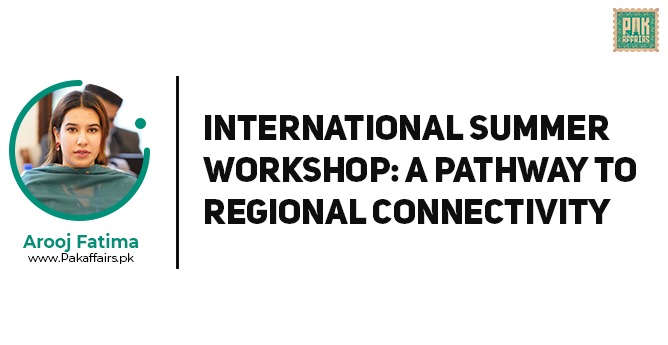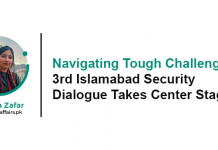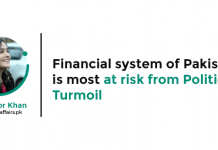Regional connectivity—a token of economic growth, development, and progress. It emerged as the recipe for prosperity in this century and has been green signaled by almost every other progressive state. So, as a South Asian student of politics and an advocate of integration, I always come up with the same pertinent question, yes regional connectivity, but when and how?
For this very reason, I got lucky enough to sit among my counterpart Pakistani and Afghan socially active and passionate Youth in order to find an answer to this question. With the guidance of qualified professors, policymakers, journalists, writers, social activists, peacebuilders, transgenders, and ministers, we brainstormed to find a collective approach to address the challenges of our region and look for a way forward. This was the International Summer school themed on “ Regional connectivity in the Pakistan-Afghanistan region” collaboratively organized by Hanns Seidel Foundation and National Dialogue Forum from 19th-27th August 2022.
During the course of this 9-days-long workshop, through communication, inclusivity, and tolerance the participants one-on-one debated about their mutual history, grievances, failures, policies, etc. all of which contributed to the present dismantled Pak-Afghan relations. We learned the ethics of debating in the session, “Ethics of healthy debate: UN simulation for peace-building” addressed by extremely talented Dr. Aamer Raza. He taught the participants the dos and don’ts of debating. (i) An unproductive debate is one where someone enters with bad intentions and perceived the other party as stupid and illogical. (ii) Avoid emotions when debating, don’t speak with your biases, and lastly know the epistemology of the person you are debating with. This session helped us understand why the Pak-Afghan conflicts keep on escalating rather than solving. Because we debate only to convince the other party rather than to understand our points of contention.
In order to be connected economically, both Pakistan and Afghanistan first have to address their political turmoil. “Until the lion learns how to write, every story will glorify the hunter”, these words of Ms. Sonal Dhanani from an African proverb roared louder than the course of many actions. She made the participants understand the power of narrative building. Made us think about the socially constructed narratives we live among and how we never try to question them. She provided us the lens to understand that what prevails in society is a “dominant story” but at the same time, there is always a “forgotten story”, the story that glorifies peace, harmony, and co-existence but is forgotten by the inhabitants. We the Youth of both countries behold the power of telling a “Transformation Story”—a new story, with a more inclusive new narrative. We can change the course of this hostile environment by picturing a new face of Pak-Afghan relations that no one depicted before. We can revive the concepts of the spiritual corridor—as explained by the brilliant Dr. Shaheer Elahi. The Pakistan-Afghanistan border is connected for centuries by the strings of Sufiism, language, culture, religion, and heritage. It is only about the misfortune events of this century that we were made to forget about our spiritually connected past. Both Pakistan and Afghanistan are the youngest countries with almost 64% of the younger population, if we the Youth start deconstructing and questioning the socially constructed dominant story of prejudice, we can play a significant role to uplift our respective countries towards the path of advancement. States, spaces, frontiers, and borders do not produce conflicts, but how these essentials are interpreted creates the differences and conflicts. Therefore, it’s high time for the Youth to understand this juncture and make the people-to-people connection work for our respective nations. As the power lies with the people, and when the people will demand peace and progress that’s when the governments will actually work for peace and progress because it is the people’s support that makes any policy work.
The twenty-first century is experiencing a paradigm shift from strategic alliance to regional integration and economic cooperation among states around the world. Mr. Haroon Sharif, former PTI minister, highlighted the means and opportunities of connectivity in this region. “Trade alone is a weak source of connectivity, but what offers a long-term stake for connectivity is “investment”, he elaborated. Moreover, the Youth can play its part in the connected and more diverse market by developing knowledge and efficiency-based skills. In the current times, labor-intensive is no more relevant rather get into the service industry by working on skills with incentives. Through this wholesome summer workshop, I, first of all, understood the structural loopholes of connectivity, then developed an understanding of my role in overcoming those obstacles—the means and opportunities, thirdly, all the participants were made to realize that not only do we need to connect our regions but also how can we benefit from this connectivity by offering our skills-based services inter-regionally.
From across the borders, the Pakistani and Afghan Youths had the same stories to narrate, stories of bloodshed, grievances, and terror as what else can we talk about when we had all witnessed war so closely? Nevertheless, the astounding part was that there was ‘hope’ among all of us, hope for a better, sustained, and prosperous future that we all are working for. And I can confidently tell you that today the environment may be polluted by voices of hate, however, these voices have failed to surpass the resilient voice of peace, harmony, and mutual progress that still echoes in the environment—the beholder of which, is the Youth.
Long live Peace.




